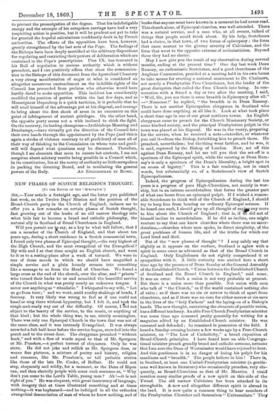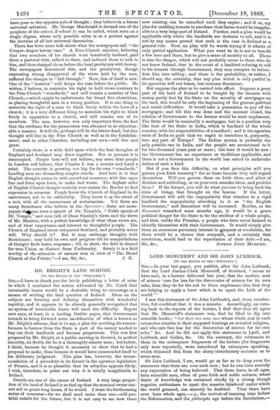NEW PHASES OF SCOTCH RELIGIOUS THOUGHT.
[TO THE EDITOR OF THE SPRCTITOR.1
SIR,—Your article a fortnight ago, and the letter you published last week, on the Twelve Days' Mission and the position of the Broad-Church party in the Church of England, induces me to -offer you a few remarks on certain phases of Scotch thought, last growing out of the busks of an old narrow theology into what bids fair to become a broad and catholic philosophy, the natural ally in Scotland of Broad Churchmen in England.
Will you permit mesay, as a key to what will follow, that I -am a member of the Church of England, and that about ten gears ago, during a short residence in a Scotch commercial town, I found only two phases of Episcopal thought,—the very highest of the High Church, and the most evangelical of the Evangelical ? My wife and I at that time sought an English church, and went to it as to a resting-place after a week of turmoil. We were in one of those moods in which we should have magnified a simple service and a plain homely sermon into something like a message to us from the Head of Churches. We found a large cross at the end of the church, over the altar, and " priests" who turned their backs to us and mumbled the beautiful service -of the Church in what was pretty nearly an unknown tongue. I -never saw anything so " ritualistic." I whispered to my wife, " Let us go from here ; " and we went, amid sundry shakings of heads, I daresay. It very likely was wrong to feel as if one could not 'kneel or sing there without hypocrisy, but I felt it, and took the Tough-and-ready way out of the difficulty. Of course, I lid not object to the beauty of the service, to the music, or anything of that kind ; but the whole thing was, to me, utterly meaningless. There was only one Episcopal Church in the town that was not of the same class, and it was intensely Evangelical. It was always crowded a full half-hour before the service began, crowded into the porch and to the street door. The clergyman preached " without book," and with a flow of words equal to that of Mr. Spurgeon or Mr. Punshon,—a perfect torrent of eloquence. Only he was stern. He did not joke and rollick as Mr. Spurgeon does, or weave fine pictures, a mixture of poetry and history, religion and romance, like Mr. Punshon's, or tell pathetic stories like those of the late Dr. Cooke, of Belfast. He could not atop, eloquently and wildly, for a moment, as the Dean of Ripon can, and then electrify people with some such sentence as, " Why don't you come to the Lord's Table, young men ? Ah !—it is not right of you." He was eloquent, with great inaccuracy of language, with imagery that at times illustrated something and at times nothing—it was haphazard—and he indulged in all the orthodox -evangelical denunciation of mea of whom he knew nothing, and of books that anyone must have known in a moment he had never read. This church alone, of Episcopal churches, was well attended. There was a natural service, and a man who, at all events, talked of things that people could think about. By his help, Scotchmea had a choice, in that town, of two forms of episcopacy ; the form that came nearest to the gloomy severity of Calvinism, and the form that went to the opposite extreme of ecclesiasticism. Beyond these they had no choice.
May I now give you the result of my observation during several months, ending at the present time ? One day last week Dean Ramsay, an enthusiastic Scotchman, and a good churchman of the Anglican Communion, presided at a meeting held in his own house to take means for erecting a national monument to Dr. Chalmers, not merely a Presbyterian Free Churchman, but the leader of the great disruption that called the Free Church into being. In con- versation with a friend a day or two after the meeting, I said, " Well, Sir, you see there is some breadth in Episcopacy after all." —" Nonsense !" he replied, " the breadth is in Dean Ramsay. There is not another Episcopalian clergyman in Scotland who could have done anything at all like it. Look at what took place a short time ago in one of our great northern towns. An English clergyman came to preach for the Church Missionary Society, or some kindred society, and the principal Presbyterian pulpit in the town was placed at his disposal. Ho was in the vestry, preparing for the service, when he received a note—interdict, or whatever you call it—from the Bishop, forbidding him to preach there. He preached, nevertheless ; but the thing went farther, and he was, it is said, reproved by the Bishop of London. Now, set off this against Dean Ramsay, and let me tell you that the set-off is a specimen of the Episcopal spirit, while the meeting at Dean Ram- say's is only a specimen of the Dean's liberality, a bright spot in an ocean of bigotry." This is a fair rendering, not in exact words, but substantially so, of a Scotchman's view of Scotch Episcopalianism.
Indeed, the progress of Episcopalianism during the last ten years is a progress of pure High-Churchism, not merely in wor- ship, but in an intense sacerdotalism that forms the greater part of what one hears from an episcopal pulpit. If I wished a reason- able Scotchman to think well of the Church of England, I should try to keep him from hearing an ordinary Episcopal sermon. If he heard one such, I should give up all thought of say' any more to him about the Church of England ; that is, if Er did not of himself incline to sacerdotalism. If he did so incline, one might venture to say that one knew churches where there was no sacer- dotalism,—churches where men spoke, in direct simplicity, of the great problems of human life, and of the truths for which our Lord lived and died.
But of the " new phases of thought " ? I may safely say that slightly as it appears on the surface, Scotland is aglow with a spirit in some cases as advanced as that of the Broad Church in England. Only Englishmen do not rightly comprehend it or sympathize with it. A little curiosity was excited here a short time ago by the presence of Dean Stanley at the General Assembly of the Established Church. "Union between the Established Church of Scotland and the Broad Church in England," said some. It was an error. Such a union is not very probable at present. But there is a union more than possible. Not union with men who talk of " the Church," as if the world contained nothing else of value ; as if there was no sin or sorrow to think of apart from churchism, and as if there was no cure for either sorrow or sin save in the lives of the " holy Fathers" and the laying-on of a Bishop's hands. The new thought, containing the elements of possible union, has a different tendency. An able Free-Church Presbyterian minister
was some time ago censured pretty generally for writing for a magazine edited by an Established-Church minister. He was
censured and defended ; he remained in possession of the field. I heard a Sunday-evening lecture a few weeks ago by a Free-Church minister, on " The Law of Catholicity," a broad exposition of Broad-Church principles. I have heard here an able Congrega- tional minister preach grandly broad and catholic sermons, sermons that lain sure the Dean of Westminster would have rejoiced to hear.
And this gentleman is in no danger of losing his pulpit for his manliness and " breadth." The people believe in him There is, in. Scotland, at least one United-Presbyterian minister (a gentle- man well known in literature) who occasionally preaches, very elo- quently, as Broad-Churchism as that of Mr. Maurice. 1 could mention many similar proofs of a new spirit on this aide of the Tweed. The old narrow Calvinism has been attacked in its strongholds. A new and altogether different spirit is abroad in the land. It is now quite a common thing to hear members of the Presbyterian Churches call themselves " Universaliate." They have gone to the opposite pole of thought ; they believe in a future universal salvation. Mr. George Macdonald is deemed one of the prophets of the school, if school it can be called, which rests on a single dogma, whose only possible value is as a protest against the doctrine of all but universal damnation.
There has been some talk about what the newspapers call " the Coupar-Angus heresy case." A Free-Church minister, believing that two members of his church were heretically inclined, paid them a pastoral visit, talked to them, and induced them to talk to him, and then charged them before the local presbytery with heresy. The newspapers denounced this, and the presbytery, though expressing strong disapproval of the views held by the men, suffered the charges to " fall through." Now, this of itself is new. One of the " heretics " still keeps the case before the public. He wishes, I believe, to maintain his right to hold views contrary to the Free-Church _" standards," and still remain a member of that Church,—which might be unfortunate for broad free-churchism, as placing thoughtful men in a wrong position. It is one thing to maintain the right of a man to think freely within the laws of a church ; it is a very different thing to maintain his right to think freely in opposition to a church, and still remain one of its members. The case, however, was only important from the fact that the evidence for the prosecution was obtained in so objection- able a manner. It will die, perhaps will be the better dead ; but free thought will live in the Free Church as well as in the Establish- ment; and in other Churches, including our own—will live and grow.
Certainly there is a wide field upon which the best thoughts of England and Scotland may draw together. But at present it is unoccupied. People here will not believe, any more than people in London will believe, that Charles I. was a martyr and Laud a saint. The country is growing too big for its own " standards." Leading men are demanding simpler creeds. And here it is that English thought comes in with sacerdotal nonsense, with line upon line and form upon form, to make bad worse. The highest order of English-Church thought scarcely ever crosses the Border to find expression in sermons. People know the Church of England in its narrowness, not in its catholicity. They know it as the creed of a sect, with all the narrowness of sectarianism. Yet there are many Scotchmen who believe in the Spectator ; there are news- papers th.can term a speech of Dr. Temple's, " Noble speech of Dr. Temple," and men talk of Dean Stanley's views and the views of Mr. Maurice, with a perfect knowledge of what those views are, and of their importance and interest to thoughtful people. The Church of England never conquered Scotland, and probably never will. Why should it? But it may exchange thoughts with Scotchmen ; may hold its own and progress till its manysidedness of thought finds warm responses ; till, in short, the field is cleared for true Union as distinct from Uniformity. Surely it is a field worthy of the attention of earnest men in view of "The Broad Church of the Future."—I am, Sir, &c., J. R.







































 Previous page
Previous page